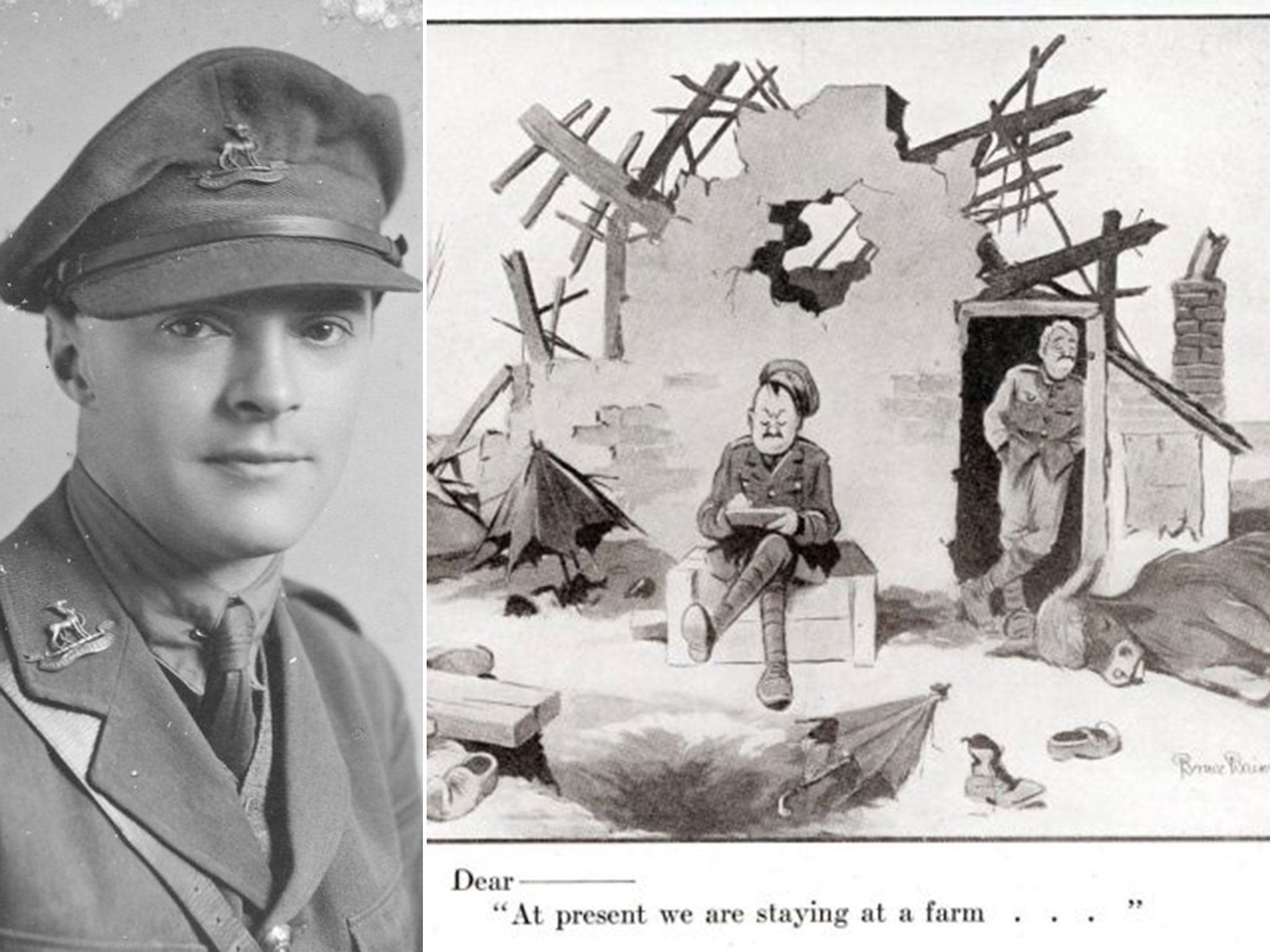The captain who gave Britain its ultimate weapon during World War One – laughter
Bruce Bairnsfather's cartoons of life in the trenches boosted morale but the establishment was not amused. Kate Youde reports on a petition to win him belated official recognition

Your support helps us to tell the story
From reproductive rights to climate change to Big Tech, The Independent is on the ground when the story is developing. Whether it's investigating the financials of Elon Musk's pro-Trump PAC or producing our latest documentary, 'The A Word', which shines a light on the American women fighting for reproductive rights, we know how important it is to parse out the facts from the messaging.
At such a critical moment in US history, we need reporters on the ground. Your donation allows us to keep sending journalists to speak to both sides of the story.
The Independent is trusted by Americans across the entire political spectrum. And unlike many other quality news outlets, we choose not to lock Americans out of our reporting and analysis with paywalls. We believe quality journalism should be available to everyone, paid for by those who can afford it.
Your support makes all the difference.He was hailed as "the man who won the war", yet Captain Bruce Bairnsfather received no official recognition of his contribution. Now, nearly 100 years on, his family is joining campaigners in calling on the Government to acknowledge in Parliament his First World War effort.
Bairnsfather, who served on the front line with the 1st Battalion the Royal Warwickshire Regiment, became a household name during the war, thanks to his morale-boosting comic sketches depicting life in the trenches.
Starring the walrus-moustached soldier Old Bill, the cartoons, which appeared in the weekly magazine The Bystander from March 1915, inspired merchandise from playing cards to handkerchiefs as well as books, plays and films. A first compilation volume of his drawings, Fragments from France, published in January 1916, went on to sell more than a million copies.
English Heritage is displaying the original artwork for his best-known cartoon, captioned "Well, if you knows of a better 'ole, go to it", as part of an exhibition, Soldiers at Stonehenge: Salisbury Plain and the Journey to the First World War, opening at the Stonehenge visitor centre on Wednesday.
Bairnsfather produced the drawing, which depicts Old Bill and another soldier in a shell hole as other shells fly past them, while posted to the 34th Division on Salisbury Plain as a machine-gun instructor, after being admitted to hospital with shellshock after the Second Battle of Ypres in April 1915.
An online petition proposes that a leading member of the Government should make a statement in the House of Commons recognising Bairnsfather's contribution, before next October's 100th anniversary of the "Better 'Ole" cartoon's publication. The campaign, launched by the military historians Major Tonie and Valmai Holt, whose book The Biography of Captain Bruce Bairnsfather: In Search of the Better 'Ole, is published on Tuesday is backed by Bairnsfather's family and organisations including the Cartoon Museum in London and the Royal Regiment of Fusiliers Museum (Royal Warwickshire).
Bruce Littlejohn, 63, the eldest of Bairnsfather's six grandchildren, who live in the United States, said parliamentary recognition would be wonderful: "I think he served... in a very interesting way, first as a soldier and second as an artist and sort of documentarian of what happened at the front. What he drew, the common soldier [and] the common man could relate to. It wasn't some high-brow take on what happened: it was an attempt to really bring home to the British people the resilience to sustain the struggle and at the same time to believe in its purpose."
Both Bairnsfather and Old Bill were at various times dubbed "the man who won the war". They were credited with boosting morale, prompting the Italian, French and American armies to ask Bairnsfather to draw their own troops. The British War Office used him for propaganda purposes, appointing him official cartoonist with the Military Intelligence Section 7B.
Yet he received no official recognition. Ms Holt said that while he was popular with the public, his work did not go down well with some parts of the establishment. "During the war, politicians in the House of Commons criticised the way he portrayed men as scruffy and ill-disciplined and said that was not the right image that should be projected of our brave heroes in the trenches," she said.
The First World War centenary has prompted renewed interest in Bairnsfather. The Royal Shakespeare Company is holding an exhibition about his life and work at the Royal Shakespeare Theatre in Stratford-upon-Avon until March. Its new play, Phil Porter's The Christmas Truce, which opens on 29 November, is inspired by events experienced by the Warwickshire regiment 100 years ago and features characters based on Bairnsfather and Old Bill.
The Department for Culture, Media and Sport declined to comment at this time.
Join our commenting forum
Join thought-provoking conversations, follow other Independent readers and see their replies
Comments